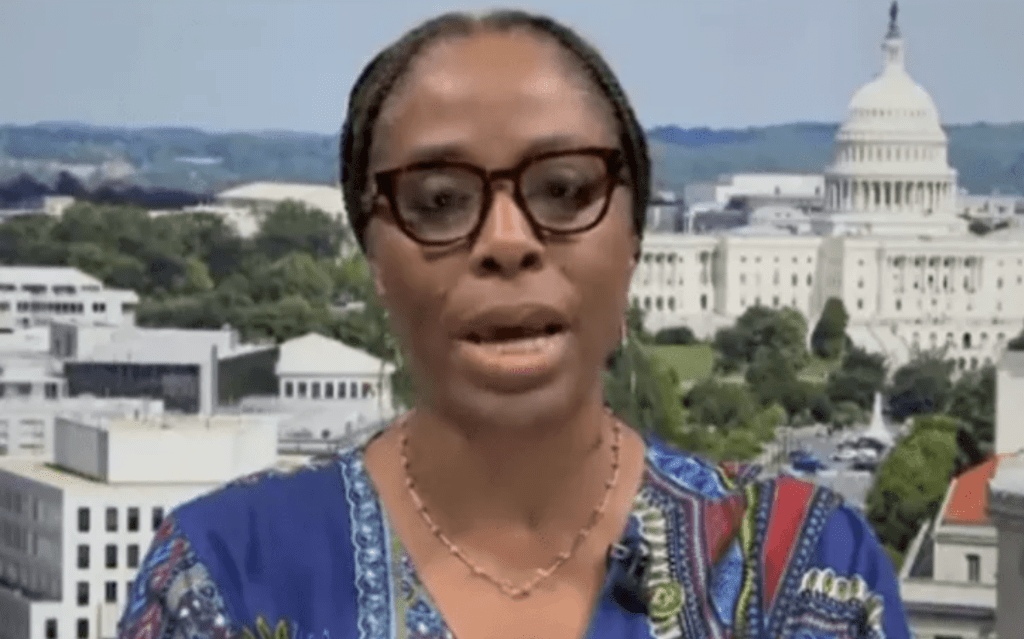
Congresswoman Stacey Plaskett from the Virgin Islands made a Freudian slip while being interviewed on MSNBC and says “And he needs to be shot — stopped.”
In a recent appearance on MSNBC, Congresswoman Stacey Plaskett from the Virgin Islands made a statement that has caused a bit of controversy and raised concerns about the safety of President Donald Trump. Discussing Trump‘s indictment, Plaskett stated, “Having Trump not only have had the codes but now having the classified information for Americans and being able to put that out and share it in his resort, with anyone and everyone who comes through should be terrifying to all Americans. And he needs to be shot — stopped.” While it is unclear if Plaskett intended these remarks or if they were a momentary lapse, her past behavior has also displayed an aggressive tone.

“This is a reckless man who believes that he is above the law, that the rules do not apply to him, and that’s the thing that I am concerned about with many of my colleagues in the GOP,” she said.
“They believe that there is a two-tiered system, but the two-tiered system is not to punish them more,” she claimed. “They want it to allow them to get away with more than everyday Americans. Causing Americans to distrust the FBI, the Department of Justice — it’s all a mechanism, and all, you know, part of their propaganda.”
During a House Judiciary Committee hearing in March, Plaskett became visibly frustrated when Republican Representative Mike Johnson from Louisiana attempted to enter a letter into the record from Louisiana Attorney General Jeff Landry regarding the issue of “political violence.” Plaskett insisted that the document could not be examined in the absence of Landry. Chairman Jim Jordan of Ohio intervened, asserting that the document itself could be examined. Plaskett, however, emphasized the importance of examining the author’s intentions behind the statement.
During this exchange, Johnson approached Plaskett’s chair and attempted to hand her the letter. Provoked by Johnson’s actions, Plaskett walked back over to him and threw the document at him. These incidents, combined with Plaskett’s recent remarks, have raised concerns about the former president’s safety.
Last year, former NYPD commissioner Bernard Kerik expressed his fear that the left might attempt to assassinate Trump if they were unable to prevent him from running in 2024. In an interview on “The Balance” with host Eric Bolling, Kerik recounted hearing discussions in 2016 about the Democrats’ desire to stop Trump, even resorting to assassination. He stressed his concern for Trump’s safety and highlighted the various attempts to remove him from office.
Dan Bongino, a former Secret Service agent and political commentator, also voiced similar concerns about Trump’s safety on his show. Bongino’s remarks came in response to reports suggesting that there is an expectation that Trump may not be present for the upcoming election.
While it remains unclear whether Plaskett’s statement about shooting Trump was a Freudian slip or a calculated comment intended for the far-left MSNBC audience, it has sparked controversy. It is worth noting that if a Republican had made a similar slip about President Joe Biden or any other Democratic party member, it would likely not be excused or ignored.
This situation raises questions about the fairness and consistency in the treatment of political figures from different parties. It is important to consider how such remarks would be viewed if they were made by individuals associated with different political affiliations.
As the public reflects on the consequences of Plaskett’s comments, it is crucial to maintain a respectful and civil discourse in political discussions. Threats or suggestions of violence undermine the democratic principles that our society is built upon. The safety of all political leaders, regardless of party, should be a priority, and discussions should focus on policy differences and constructive dialogue rather than personal attacks or incendiary language.
In a time when the country faces numerous challenges, fostering an environment of respect, understanding, and open dialogue is crucial for the betterment of our democracy.
